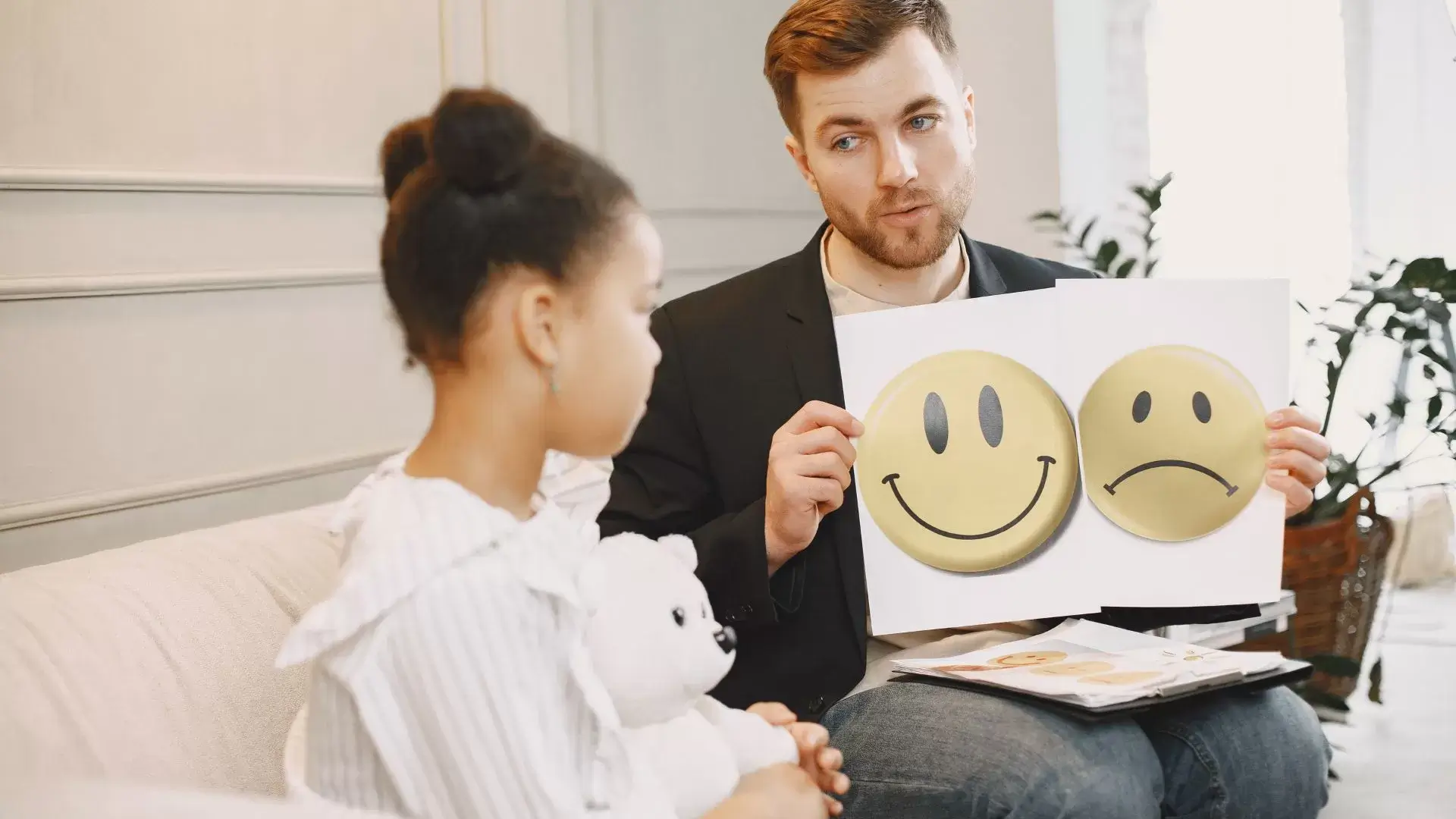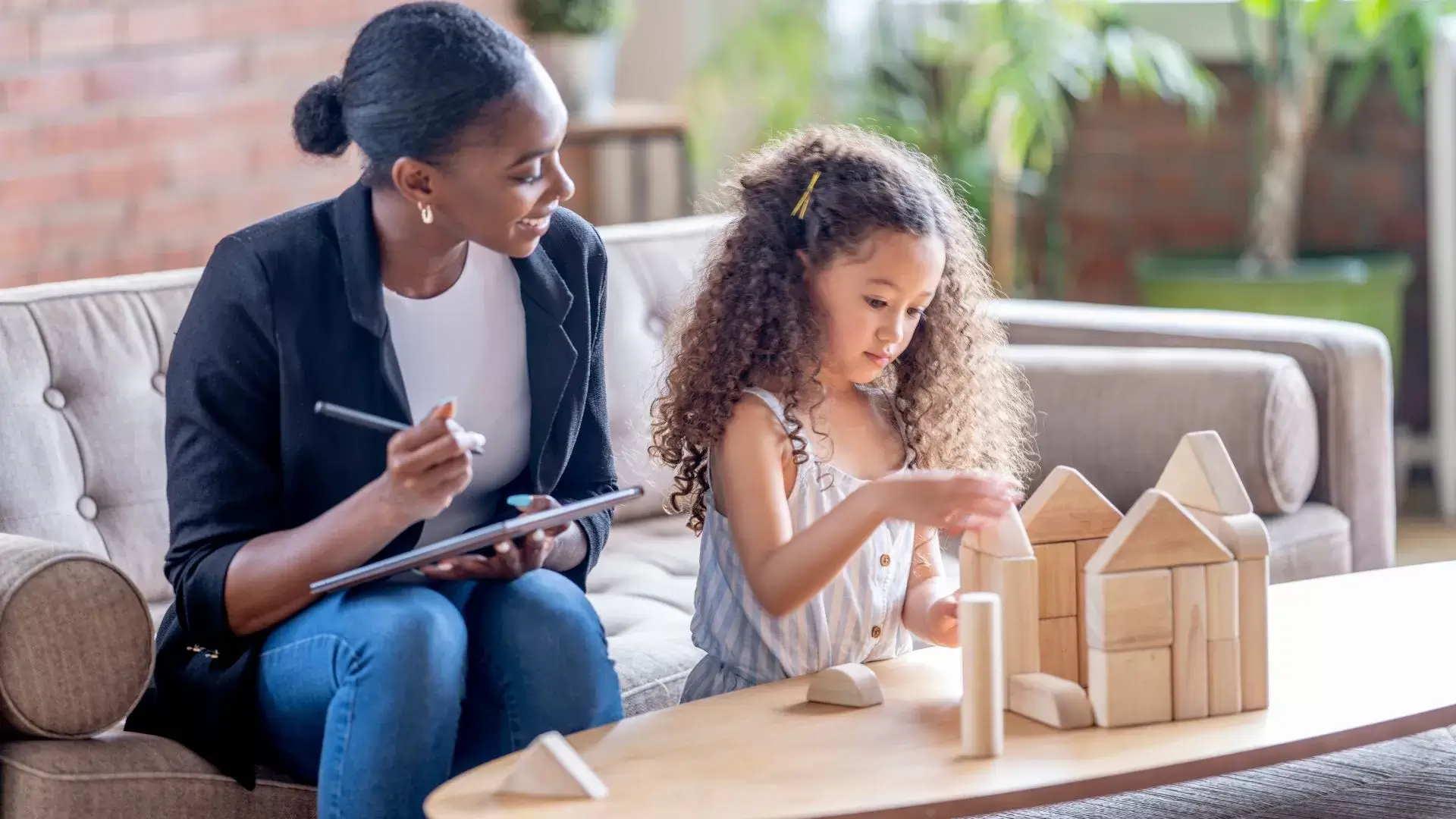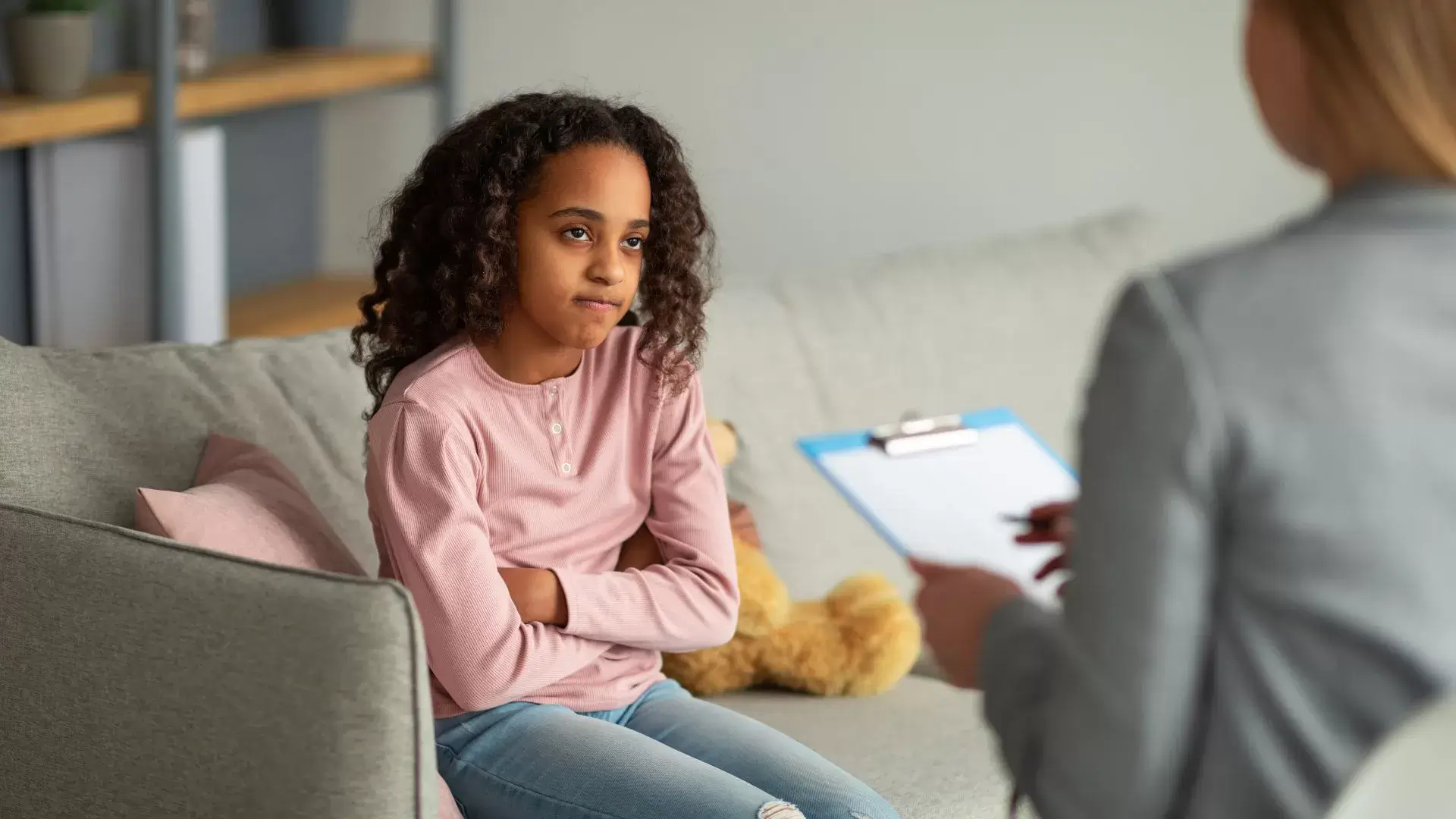Child Counseling Psychotherapy
We recognize that child counseling psychotherapy is essential for fostering emotional well-being in children. It helps them navigate complex feelings and develop coping strategies, empowering them to thrive. Our approach combines various techniques, like play therapy and cognitive behavioral therapy, tailored to each child’s unique needs. We appreciate how family dynamics play a significant role in a child’s emotional health, so we create a supportive environment for open communication and growth. Together, we can strengthen family bonds and address underlying issues. If you’re interested, you’ll find more insights on how this therapeutic journey can benefit your child.

About Our Psychotherapy Counseling Services
At our practice, we recognize that every child is unique, and we’re committed to providing tailored psychotherapy counseling services that meet their individual needs. Our focus extends beyond the child, as we realize that family dynamics play an essential role in emotional health. Through family counseling, we aim to enhance family communication skills and provide the emotional support necessary for navigating parenting challenges.
We utilize various family therapy techniques to foster conflict resolution and strengthen relationships within the family. Our approach includes therapy for parenting, helping parents develop effective strategies to address their children’s needs while managing their own emotional well-being. We believe that improving family emotional health is a collaborative effort, and we’re here to guide families in identifying and overcoming obstacles together.
In every session, we prioritize creating a safe space where families can express their feelings and concerns. By offering parenting support and resources, we empower families to build resilience and establish a nurturing environment. Ultimately, our goal is to equip families with the tools they need to thrive, fostering a sense of unity and understanding that benefits everyone involved.
Understanding Child Mental Health and Emotional Well-Being
Recognizing the significance of family dynamics in emotional health, we also understand that a child’s mental health and emotional well-being are deeply influenced by their environment and relationships. By fostering strong family support, we can enhance a child’s emotional growth. Effective parenting strategies and open family communication play crucial roles in creating a nurturing atmosphere.
Family counseling services can provide valuable insights into how family dynamics affect a child’s mental health. Through family dynamics therapy, we can identify patterns that may hinder emotional well-being, allowing us to focus on building resilience within the family unit. The benefits of family therapy extend beyond individual issues; they encourage healthier interactions and strengthen bonds.
It’s important to remember that a supportive environment can greatly impact a child’s emotional well-being. By working together as a family, we can create a solid foundation that promotes stability and understanding. Emphasizing emotional growth and resilience guarantees that our children feel secure and valued. Ultimately, prioritizing child mental health within the family context is essential for nurturing happy, well-adjusted children who are equipped to face life’s challenges.
Benefits of Child Counseling Services
Child counseling services offer essential support that can empower children to navigate their emotions and develop coping strategies in a safe and understanding environment. By engaging in family counseling for teens, we can foster family emotional balance and improve communication skills within the family unit. This approach helps us identify and address family behavior patterns that may be contributing to stress and emotional distress.
As we work together, we’ll discover effective family stress management techniques that promote healing and understanding among family members. The benefits of child counseling extend beyond the individual child, impacting the entire family dynamic. By setting clear family therapy goals, we create a roadmap for progress, enhancing overall family wellness.
Moreover, these services provide essential family support services that encourage open dialogue and connection. Through counseling, we can strengthen our family bonds, ensuring that everyone feels heard and valued. Ultimately, child counseling services not only empower our children but also guide families toward a healthier, more harmonious life together. We’re not just addressing individual challenges; we’re nurturing a supportive environment where everyone thrives.
Play Therapy: A Creative Approach for Kids
Play therapy offers an engaging and effective way for children to express their feelings and experiences through creative play, helping us understand their inner world better. This therapeutic approach taps into children’s natural inclination for play, allowing them to communicate in ways that words often can’t capture. By using family counseling techniques within play therapy, we can foster emotional connection and strengthen family relationships.
As we observe children during these sessions, we can identify underlying family behavior issues that may affect their mental health. Play therapy encourages the development of family trust, creating a safe space for children to explore their feelings. By integrating conflict resolution strategies, we can help children navigate their emotions and learn healthier ways to express themselves.
Moreover, these interventions not only benefit the child but also promote family unity. When families engage in this process together, they better understand each other’s perspectives, leading to improved communication and collaboration. Ultimately, play therapy provides an essential opportunity for families to heal and grow, enhancing overall family mental health and resilience. Together, we can work towards creating a supportive environment that nurtures emotional well-being for everyone involved.

Cognitive Behavioral Therapy (CBT) for Children
Cognitive Behavioral Therapy (CBT) offers a structured and effective approach for helping children understand and manage their thoughts and emotions, equipping them with valuable skills for coping with life’s challenges. Through CBT, we can guide children in recognizing negative thought patterns and replacing them with positive ones, enhancing their communication skills and emotional resilience.
In family therapy or during family counseling sessions, we often see how family dynamics contribute to a child’s emotional well-being. By addressing family stress and exploring family roles, we can work together to create a supportive environment. Parenting counseling can also be beneficial, as it helps parents develop effective strategies for communication and problem-solving within the family.
As we engage in therapy for family issues, we foster connections that strengthen family bonds. This approach not only benefits the child, but it also empowers families as a whole. Through family guidance, we can encourage healthy interactions that promote understanding and love, ultimately leading to a happier, healthier family life. Together, we can nurture our children’s growth and guarantee that they have the tools to face their challenges with confidence.
Addressing Childhood Trauma Through Counseling
Recognizing the impact of negative thought patterns is just one step; addressing childhood trauma through counseling is essential for helping children heal and regain a sense of safety and stability in their lives. By engaging in psychotherapy counseling services, we can create a supportive environment where children feel safe to express their feelings and experiences.
Family mental health support plays a significant role in this process. Utilizing family intervention strategies, we can address the root causes of childhood trauma, promoting conflict prevention and fostering healthier family dynamics. Family therapy approaches allow us to work together, strengthening family structure and enhancing parenting skills, which in turn aids in family conflict resolution.
The benefits of family counseling are clear: it not only supports the child but also helps parents understand their important role in the healing journey. By embracing open communication, we can nurture resilience in our children, enabling them to process their trauma effectively. Together, we can cultivate a space where our children can learn to cope, grow, and thrive, paving the way for a brighter, more hopeful future.
Managing Anxiety and Depression in Children
Often, children struggle with anxiety and depression, making it essential for us to provide them with the right tools and support to navigate these challenges effectively. By incorporating family-centered therapy, we can address the root causes of their feelings, often linked to family trauma or intergenerational family issues. It’s important for us to recognize how family values shape a child’s emotional landscape.
Through family counseling tools, we can facilitate discussions that promote family conflict management and strengthen family bonds. Parenting workshops can empower caregivers with strategies to help their children cope, ensuring they feel understood and supported. We believe that positive family therapy outcomes stem from open communication, where resolving family conflicts becomes a shared goal.
Building Social Skills and Self-Confidence
Helping children build social skills and self-confidence is essential for their overall development, as these abilities enable them to form meaningful relationships and navigate social environments with ease. We recognize that family conflicts and relationship challenges can sometimes hinder this process, especially in blended families where dynamics can be complex. By fostering an environment of family collaboration, we can help children feel supported and secure.
One effective approach is engaging in family mediation to address any concerns regarding sibling relationships. When children witness their parents working through family problem resolution together, they learn valuable lessons about communication and empathy. This not only enhances their self-confidence but also encourages them to practice their social skills in various settings.
We can create opportunities for children to interact with peers, whether through group activities or playdates. Encouraging open conversations about feelings can also empower kids to express themselves, further boosting their self-esteem. By prioritizing family harmony and teaching our children how to navigate social situations, we lay a strong foundation for their future relationships, helping them thrive in an ever-changing world. Let’s commit to guiding them on this important journey together.
Parent-Child Counseling and Family Dynamics
Maneuvering the complexities of family dynamics can sometimes challenge the relationships between parents and children, making parent-child counseling a valuable resource for fostering understanding and connection. At Psychotherapy Counsellors, we recognize that family life challenges can create tension and misunderstandings.
In our counseling sessions, we provide a safe space for both parents and children to express their feelings and concerns. We help families identify underlying issues and work collaboratively to find solutions. By focusing on communication and empathy, we aim to bridge the gap between differing perspectives.
Often, family issues stem from miscommunication or unmet needs. We encourage open dialogue, enabling parents and children to articulate their thoughts without fear of judgment. This process not only strengthens their bond but also equips them with tools to navigate future challenges.
If you’re struggling with family life challenges, don’t hesitate to reach out. Together, we can explore the dynamics of your family and foster healthier relationships, ensuring that every family member feels heard and valued.
Early Intervention and Therapy for Childhood Challenges
Recognizing the signs of childhood challenges early can greatly enhance a child’s emotional and psychological well-being, paving the way for effective interventions and support. It is understood that when we address issues like anxiety, behavioral problems, or learning difficulties promptly, we’re not just alleviating current distress; we’re also fostering resilience and future success.
Early intervention often involves tailored therapy approaches that fit a child’s unique needs. For instance, play therapy allows kids to express their feelings in a safe environment, while cognitive-behavioral therapy can help them develop coping strategies. We can also engage parents in the process, providing them with the tools and knowledge to support their child’s growth.
It’s essential that we maintain open lines of communication, ensuring that children and their families feel heard and understood. We’re all in this together, and by collaborating with educators, therapists, and parents, we create a supportive network. When we act early, we empower children, giving them the chance to thrive emotionally and socially. Let’s commit to early intervention, making a lasting difference in the lives of our children.

Grief Counseling and Emotional Support for Children
When children experience loss, it’s essential that we provide them with compassionate grief counseling and emotional support to help them navigate their feelings and find healing. Grief can manifest in various ways, and it’s crucial to understand that each child processes loss differently. They might express sadness, anger, confusion, or even guilt, and we need to create a safe space for them to explore these emotions.
We can start by encouraging open conversations about their feelings. Asking gentle, open-ended questions allows them to express themselves without fear of judgment. It’s also important to validate their emotions, reassuring them that it’s okay to feel sad or upset. We can share age-appropriate explanations about death and loss, helping them comprehend what’s happened in a way they can understand.
Moreover, engaging in activities such as art or play therapy can be incredibly beneficial. These methods allow children to express their grief in non-verbal ways, providing an outlet for their emotions. By offering our support and understanding, we help them build resilience and find comfort in their memories, guiding them toward healing. Together, we can help them navigate this challenging journey with compassion and care.
Therapy for ADHD and Behavioral Issues
Supporting children with ADHD and behavioral issues requires a tailored approach that combines understanding their unique challenges with effective therapeutic strategies. We recognize that each child is different, and it’s essential to meet them where they are. Our goal is to create a safe space where they can express themselves without judgment.
We often utilize Cognitive Behavioral Therapy (CBT) to help children understand their thoughts and feelings, allowing them to develop coping strategies. This method not only addresses behavioral concerns but also fosters emotional regulation, which is important for their overall well-being. We also explore play therapy, as it enables children to communicate through play, making it easier for them to process their emotions and experiences.
In addition, we involve parents in the therapeutic process, guiding them on how to reinforce positive behaviors at home. By working together, we can establish consistent routines and expectations that help children thrive. Ultimately, our aim is to empower these children, helping them build confidence and resilience as they navigate their challenges. With compassion and understanding, we’re committed to supporting their growth and development every step of the way.
Bullying Support and School Counseling
Bullying can have a profound impact on a child’s emotional and social development, so we take a proactive approach in school counseling to address these issues head-on. Our goal is to create a safe environment where children feel comfortable sharing their experiences. We believe that by fostering open communication, we can help children understand that they’re not alone and that support is available.
We work with both the victims and the bystanders, promoting empathy and resilience among students. Through individual and group counseling sessions, we provide a space for children to express their feelings and develop coping strategies. We also educate students about the dynamics of bullying, helping them recognize unhealthy behaviors and understand the importance of seeking help.
Moreover, we collaborate with teachers and school staff to implement anti-bullying policies and workshops. This way, we can guarantee that our efforts extend beyond counseling sessions and create a supportive school culture. Together, we can empower children to stand up against bullying, enhancing their emotional well-being and fostering a sense of community. Our collective aim is to guarantee every child feels valued, supported, and safe in their school environment.
Mindfulness and Emotional Regulation Techniques for Kids
Mindfulness practices can be a powerful tool for helping kids learn emotional regulation, allowing them to better navigate their feelings and reactions in various situations. By introducing simple mindfulness exercises, we can create a safe space for children to explore their emotions without judgment. Techniques like deep breathing, body scanning, and guided imagery can help kids become more aware of their feelings and the physical sensations that accompany them.
When we practice mindfulness together, we’re teaching kids to pause and observe their emotions rather than react impulsively. This shift in awareness can lead to improved emotional regulation, as they learn to identify triggers and respond thoughtfully. For instance, if a child feels overwhelmed, taking a few deep breaths can ground them, fostering a sense of calm.
Additionally, incorporating mindfulness into daily routines—like mindful eating or nature walks—can reinforce these skills. By making mindfulness a part of our everyday lives, we’re equipping kids with lifelong tools to manage stress and emotions. In supporting our children through these techniques, we’re not just helping them cope; we’re empowering them to thrive emotionally and socially.
Reach Out for Professional Child Counseling Services
Reaching out for professional child counseling services can be an essential step in helping our children navigate their emotions and challenges more effectively. We understand that life can be overwhelming for kids, and sometimes they need an extra layer of support. By seeking professional help, we’re not just addressing immediate issues; we’re investing in our child’s long-term emotional well-being.
Counselors trained in child psychotherapy understand the unique ways children express themselves. They use age-appropriate techniques to create a safe space where our kids can feel heard and understood. This can empower them to articulate their feelings, build coping strategies, and develop resilience.
It’s important for us to remember that asking for help isn’t a sign of failure; it’s an act of love and commitment to our child’s growth. We all want our children to thrive, and professional support can provide the tools they need to do just that.
When we reach out for these services, we open doors to resources, guidance, and a community that supports our family’s journey. Together, we can guarantee our children have the foundation to face life’s challenges with confidence.
Frequently Asked Questions
How Can I Tell if My Child Needs Counseling?
When we think about whether our child needs counseling, we should look for signs like persistent sadness, changes in behavior, or difficulties in school. If they seem withdrawn or are struggling to manage emotions, it might be time to seek help. Trusting our instincts is important; we understand our child best. Open communication can help us understand their feelings and experiences better, guiding us toward the right support when needed.
What Age Is Appropriate to Start Child Counseling?
When it comes to starting counseling for children, there isn’t a one-size-fits-all age. We recognize every child’s emotional and developmental needs are unique. Generally, we can consider counseling around ages 5 to 6, when kids begin to express feelings and face challenges. However, if we notice signs of distress or difficulties earlier, it’s okay to seek help sooner. The important thing is to guarantee our child feels safe and supported throughout the process.
How Long Does a Typical Therapy Session Last?
Typically, a therapy session lasts about 45 to 60 minutes, depending on the individual’s needs and the therapist’s approach. We’ve found that this timeframe allows for meaningful conversations without feeling rushed. It’s important for us to feel comfortable and engaged, so we can explore thoughts and feelings thoroughly. Each session’s length can be adjusted if needed, ensuring we’re getting the support we deserve.
Will My Child's Sessions Be Confidential?
When it comes to confidentiality in therapy, it’s essential to understand that trust forms the foundation of the therapeutic relationship. Typically, what we discuss in sessions stays private, with some exceptions for safety reasons. We believe in creating a safe space where our child can express themselves openly, knowing their feelings and thoughts are respected. If we have any concerns, we’ll always communicate with you, ensuring we’re on the same page.
How Can I Support My Child During Therapy?
Supporting our child during therapy is essential. We should create a safe space for them to express their feelings and thoughts. Let’s encourage open communication, showing we’re always ready to listen without judgment. It’s also important to be patient, as they may need time to process their emotions. Additionally, we can share our own feelings and experiences, helping them feel less alone in their journey. Together, we can support their growth and healing.


